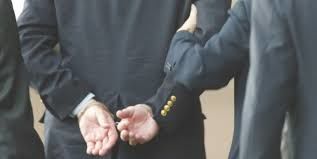

Given the tremendous attention that is given to street crime by politicians, law enforcement authorities, judges, and the news/entertainment media, one would think that street crime is the costliest type of criminal activity in the U.S. That is simply not the case.
In fact, white-collar crime such as embezzlement and stock manipulation is far more costly to society than blue-collar or street crime such as robbery. According to the FBI, the annual cost of street crime is $15 billion compared to nearly $1 trillion for white-collar crime.
If you are shocked by these statistics, it is not surprising. So much more attention is directed to street that most of us simply do not realize the magnitude and consequences of white-collar crime and other forms of elite deviance in the U.S.
Moreover, white-collar and elite criminals benefit from institutionalized non-enforcement practices, regulatory policies, and legal representation not available to street criminals. As a result, white-collar criminals are extremely difficult to apprehend and prosecute, even when they do tremendous harm to society.
Exactly what are white-collar crime and elite deviance? White-collar crime involves lying, cheating, and stealing by business and government professionals within the context of their employment. The term white-collar crime—reportedly coined in 1939 by criminologist Edwin Sutherland—is now synonymous with the full range of crimes committed by business and government professionals.
Contrary to what many people believe, white-collar crime is not a victimless crime. A single scam can destroy a company, devastate families by wiping out their life savings, or cost investors billions of dollars (or even all three, as in the infamous Enron case). Today’s fraud schemes, including Bernie Madoff’s “Ponzi scheme,” are more sophisticated than ever, according to the FBI.
Wealthy elite criminals such as Madoff or Bernie Ebbers of WorldCom can hire the finest defense attorneys in the world to represent them in court, as well as prestigious public relations firms to spin their criminality into acts of charity and goodwill. Poor street criminals cannot afford such luxuries.
Moreover, the crimes of privileged individuals within the context of either legitimate corporations or government offices frequently go undetected and unprosecuted due to the relative power, status, and political influence of the perpetrators. Such individuals are often shielded from prosecution by corporate law and their greedy allies who have similar interests.
Indeed, as far back as 1956, the late sociologist C. Wright Mills observed that a small group of wealthy and powerful individuals control America’s dominant institutions (i.e., politics, economy, and the military) and they are insulated from public scrutiny. Mills called this group the power elite. Interestingly, Mills was echoed in 1961 by President Eisenhower in his farewell address when he warned of the self-serving and criminal acts of the “military-industrial complex”—that is, his term for the power elite.
A central contradiction of the power elite is that they frequently violate the very laws they are sworn to uphold. Mills argued that bound by mutual interests, the power elite periodically commit acts of elite wrongdoing (e.g., dumping toxic waste) and enact policies (e.g., deregulation of dangerous industries) that are designed to preserve their political power and protect their profits. Mills stated that elite acts that cause either physical or social harm represent the “higher immorality of the power elite” or simply elite deviance.
Acts of elite deviance take place in part because of the way corporate, political, and military intelligence institutions are structured—that is, they are complex bureaucracies. Significantly, bureaucratic organizations are structured in ways that regularize crime and deviance. More specifically, bureaucracies are goal-oriented, amoral entities which exist to maximize profits and/or expand their own power. These goals encourage ends over means mentality among the top commanders of bureaucracies.